
Interviews “A constant juggling act”
Working from home, distance learning, 24/7 family togetherness: Due to the pandemic, three quarters of the DPMA staff are currently working from home. Patent examiner Dr Veronika Kleißl and trade mark examiner Markus Niemann talk about how they reconcile work and family life – and how they are still here for their customers.
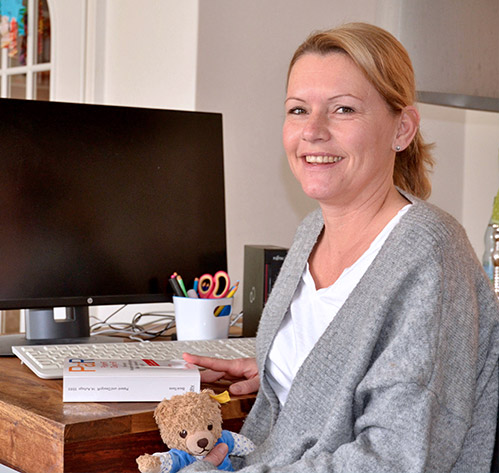
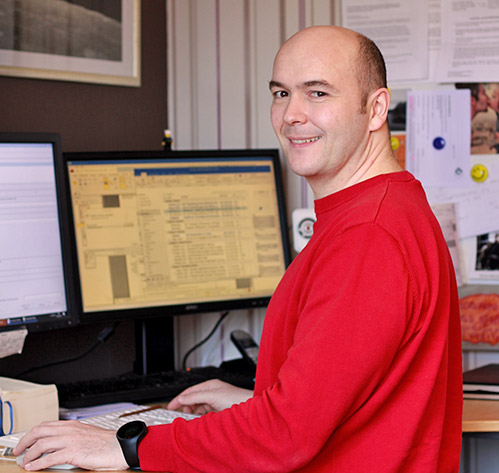
Dr Kleißl, Mr Niemann, working from home, distance learning and often, at the same time, full-time childcare: How much has the pandemic affected your everyday working life?
Dr Kleißl: During the first lockdown from March 2020, it was indeed exhausting sometimes: my husband and I, both working, two small children — and all of us at home all the time. It’s hard to cope with everything: work, the children, the household. Suddenly, I had to cook at lunchtime and put something on the table because the children were home every day. That was a challenge. Luckily, at the moment the children are again going to their institutions.
Niemann: For us, things were functioning quite well during the first lockdown. But as time passed, the everyday burden became more noticeable. Running the household, providing lunch – as my wife didn’t have the opportunity to work from home for a long time, I managed most of this alone. And of course there was distance learning too. Our daughter is 14, she coped well with it. Initially, it was somewhat more difficult for our son. According to the motto: We don’t have school, so I don’t have to do anything.
Distance learning — a difficult topic for many parents during the pandemic. What was your experience?
Niemann: At the beginning, the school’s digital tools did not work so well — and of course the teachers had no experience in managing distance learning. Without school, it was not so easy for us to develop an effective daily routine for the children. However, over time, they have settled into a good routine. The assignments arrived reliably and the children participated well. At some point, they realised that they couldn’t avoid it.
Dr Kleißl, your children are even younger. What challenges did you face at home?
Dr Kleißl: For example, there was the question of who can work best where. My husband set up his office in the basement, I in the attic room. At first, the children were at home all day long and had to be looked after and kept busy. However, my husband has many conferences and appointments and his schedule is very tight. I can work more flexibly, so I looked after the children during the day.
And work?
Dr. Kleißl: We got up, then I played with the children, but at the same time I was reading e-mails to see what needed to be done. However, the only time I was actually able to work in peace was when my son was asleep at lunchtime and then in the evenings or sometimes at the weekend when my husband had time to take over. All in all, we managed well, but needed to be very well organised. The fact that the external childcare provision is now available again has eased the situation dramatically. We now have time in the afternoons to really be there for the children. I am glad that this constant juggling act and inability to meet everyone’s needs is over for the time being.
How have colleagues and superiors understood the problem of reconciling work and family?
Dr Kleißl: In our division, there was a lot of understanding from all sides. I am a group leader myself and also have a young mom in my team. We frequently conferred with each other in the evenings because we had similar daily routines. My direct supervisor was also very understanding and repeatedly reminded me to take rest periods.
Niemann: My team leader is also the father of children of a similar age. For that reason alone, I met with understanding from him. But the colleagues too showed a lot of consideration for each other.
Despite the pandemic, the DPMA presented a very good performance record for 2020. Does that match your personal impressions at work?
Dr Kleißl: Indeed, I don’t think our efficiency has suffered — on the contrary. We just had to reorganise. But overall, the output was the same as before.
Niemann: We keep monthly statistics, and there was no sign of a drop. For me it has even been more efficient, because of course I save on commutes and I can squeeze in a lot of things that need to be done.
How much has the DPMA’s digital working method in the digital IP case files helped in this situation?
Dr Kleißl: Of course, that was the crucial advantage. It worked perfectly with our system. I can communicate digitally, work digitally, sign digitally. If our work was still paper-based, we wouldn’t have managed to get through the crisis nearly as well. I would have had to go to the office again and again to get more files.
Niemann: I think that if a pandemic had broken out 10 or 15 years ago, we would almost have had to give up. It might have been possible to send decisions back and forth using USB sticks. However, sometimes we would have had to conduct searches at the library. Everything is much easier with our electronic databases and systems. In terms of equipment, my workspace at home is no different from my office at the DPMA. Equipment like we have is hard to find, at least anywhere else in the public service sector. That is fantastic!
And communication with applicants?
Niemann: The communication options were not limited while working from home. During the lockdown, I noticed that many applicants were working from home as well — for example, because there were children’s voices or cooking sounds in the background. This actually created a very friendly atmosphere.
Dr Kleißl: That is something I can confirm. Contact with patent attorneys was very good and scheduling was very flexible. There was also a lot of mutual understanding. I am also very glad that we in the public sector, despite the additional burden, at least do not have to worry about our livelihoods in the pandemic situation like people in other jobs.
You are talking about the sectors affected by the pandemic?
Dr Kleißl: Yes, it is indeed a matter of concern when you see that business people in the hospitality and catering industry have not had any income for months. Or that people working in the cultural sector, musicians, actors and many others cannot work in their métier at all due to restrictions or only to a very limited extent. In comparison, we have always had it very good.
Many surveys show that people would like to work more from home, even after the pandemic. So do you think it is best to work from home full time?
Dr Kleißl: The DPMA has had very flexible working time schemes for a long time. Even in the past, I worked 80% of the time from home. Since I became group leader, I have worked 50% of the time at the office and 50% at home – under normal circumstances. This flexibility could be further expanded. We can see that working from home is also very efficient. However, working from home for 100% of the time would not be the right scheme for me. Actually, I think it’s nice and also helpful to see colleagues in person and to be able to meet face to face, which makes it easier to perceive their moods.
Niemann: In the first months of the lockdown, I could have imagined working 100% of the time from home even post-pandemic. Now I wouldn’t want that any more. After a while, the attraction is fading a bit. Direct contact with the team is very important. I think it’s like many other things in life: it’s the variety and the mix that matter.

Health management Between ergonomics and pandemic
Distribution of face masks, new hygiene standards, information about infection risks: In times of the coronavirus pandemic, our occupational health management is more important than ever. The team also continues to focus on other health topics.
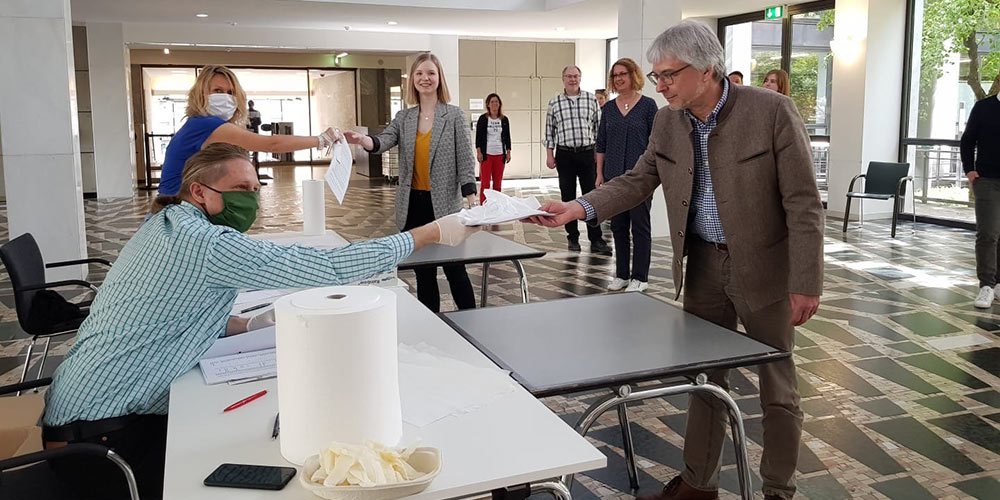
The Central Unit 4.0.1 Health and Safety is responsible for implementing occupational health management, aiming at promoting and maintaining the health of staff in the workplace. Specifically, this means the creation of safe working conditions through effective occupational health and safety measures, a health-conscious design of the working environment, work organisation and work processes at the DPMA and the promotion of the health competence of executives and staff. As a result of the arrival of COVID-19, the work of the Central Unit 4.0.1 gained even more importance, as it defined the framework conditions for working during the pandemic.
Since the onset of the pandemic, the focus of occupational health management has completely shifted to fighting the virus. Protection against infection was and continues to be the primary concern which was addressed by taking appropriate measures to prevent COVID-19 from entering the premises of the DPMA as far as possible and to minimise the risk of transmission.
An emergency team was immediately set up at the DPMA in order to make informed decisions on the necessary measures of infection control during the pandemic. The Central Unit 4.0.1 is represented in the emergency team providing support with regard to the following topics:
- Advising on occupational health and safety, e.g. occupational health and safety standards/rules during the pandemic, dealing with at-risk groups at the DPMA, course of action in the event of COVID infections/after contact with COVID-infected persons, policy regarding returning travellers, access authorisation for external visitors
- Continuous update on the tracking of the suspected and confirmed cases of COVID-19 at the DPMA and monitoring of the pandemic at all DPMA locations
- Developing a key figure management system as a basis for taking decisions on further measures
- Information on the latest scientific findings on COVID-19
The following specific measures have been taken by the Central Unit 4.0.1 to help our staff to fare well during the pandemic:
- Implementation of the applicable occupational health and safety standards during the pandemic, e.g. maximum occupancy of the (office) rooms at the DPMA, policy for returning travellers or granting leave of absence to persons in the vulnerable groups
- Information about COVID-19 through regular publications (e.g. general information about the coronavirus, about modes of transmission, hygiene rules and behavioural guidelines, mental health, etc.)
- For reporting all suspected and positive cases, a COVID mailbox was established. In this regard, the Central Unit 4.0.1 then initiated the necessary measures, such as contact tracing within the DPMA
- Providing protective equipment (e.g. masks, cleaning cloths, disinfectants)
- Influenza and pneumococcal vaccinations
- Offering programmes to promote physical and mental health also for staff working from home
Since the beginning of the pandemic, the everyday working routine at the DPMA has changed rapidly: A large proportion of the staff work from home. On the one hand, this helps to protect their health, on the other hand, it also allows staff to fulfil their personal duties (e.g. home schooling, caring for relatives, etc.) and thus to better reconcile work and private life during this special time.
The pandemic will also have a lasting impact on the world of work and consequently also change the need for occupational health management services. We hope that, in addition to corona-related health measures, we will again be able to have a broader focus on promoting health and creating healthy working conditions in 2021.

Work and family The DPMA as a five-star employer
The further improvement of the work-life balance is an important strategic goal for the German Patent and Trade Mark Office. This is shown by, for example, awards for family-friendliness and the special contribution to the empowerment of women.
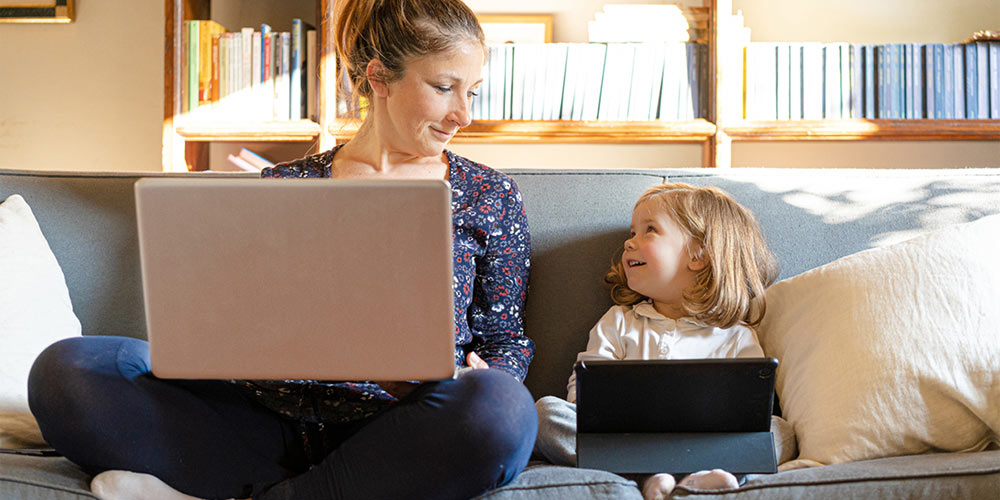
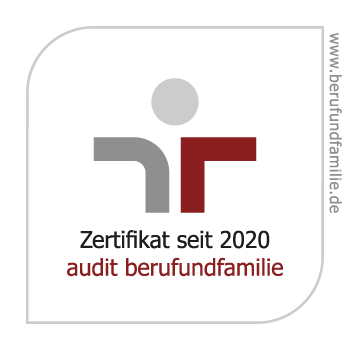
The German Patent and Trade Mark Office (DPMA) was again recognised as a flexible and family-friendly employer in 2020.
With the successful audit workandfamily (audit berufundfamilie) audit, the DPMA has proven that it particularly champions the work-life balance. “The certificate and the rating we scored in the study show that we vigorously pursue our strategic goal to promote the work-life balance,” says DPMA President Cornelia Rudloff-Schäffer, adding that this also benefits the office as an employer. “Good and flexible working conditions are one of the most important advantages in recruiting qualified staff today,” the President emphasises.
The audit workandfamily (audit berufundfamilie) certificate is awarded by berufundfamilie Service GmbH. The company sees itself as a service provider and think tank concerning the reconcilability of work, family and private life. It advises companies, institutions and universities on the implementation of a sustainable personnel policy that is family-friendly and takes into account the phases of life. The audit was carried out in several steps: In addition to a review of the status quo, workshops were held for the executive and non-executive staff of the office to address the reconcilability of work, family and private life in more detail.
To take a broad range of experiences into consideration, staff with different schemes as to when and where they work as well as staff with and without duties to care for children and/or elderly persons were involved in these workshops. Based on the workshop results, new targets were agreed, which the DPMA will now implement. The implementation will be examined each year.
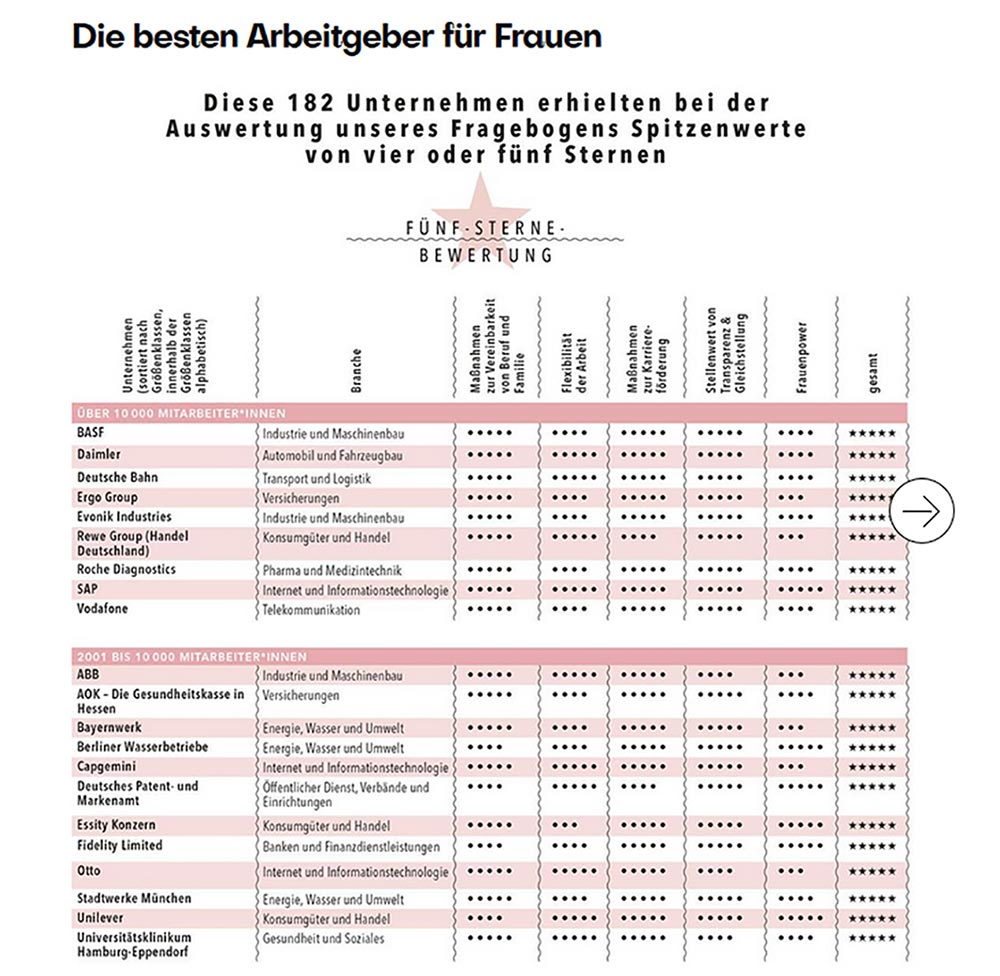
Last year, in a study by Brigitte, a women’s magazine in Germany, the DPMA received five out of five stars and is thus one of the 182 best employers for women in Germany. This was the third time Brigitte, together with the HR marketing agency Territory Embrace, honoured the best employers for their excellent contribution to the empowerment of women. The study covered 257 organisations, examining their commitment to the four areas important for equal opportunities for women: reconcilability of work and family, flexibility of work, career advancement measures and the value attached to transparency and equal opportunities in the organisation. The percentage of women in executive positions and the self-imposed women’s quotas also increased the score (woman power criterion).
In the group of organisations with 2,001 to 10,000 staff, the DPMA is one of 12 employers with a five-star rating and is thus a prime player in the ranking of the 182 best employers for women in Germany. The DPMA scored particularly well in the following categories: flexibility of work, value attached to transparency and equal opportunities in the organisation and woman power.
The study is a useful guide for women looking for female-friendly employers – throughout Germany and across all industries. An overview of all 182 organisations with top ratings, i.e. four- or five-star ratings, and further results and information are provided in the Brigitte magazine, issue 21/2020.